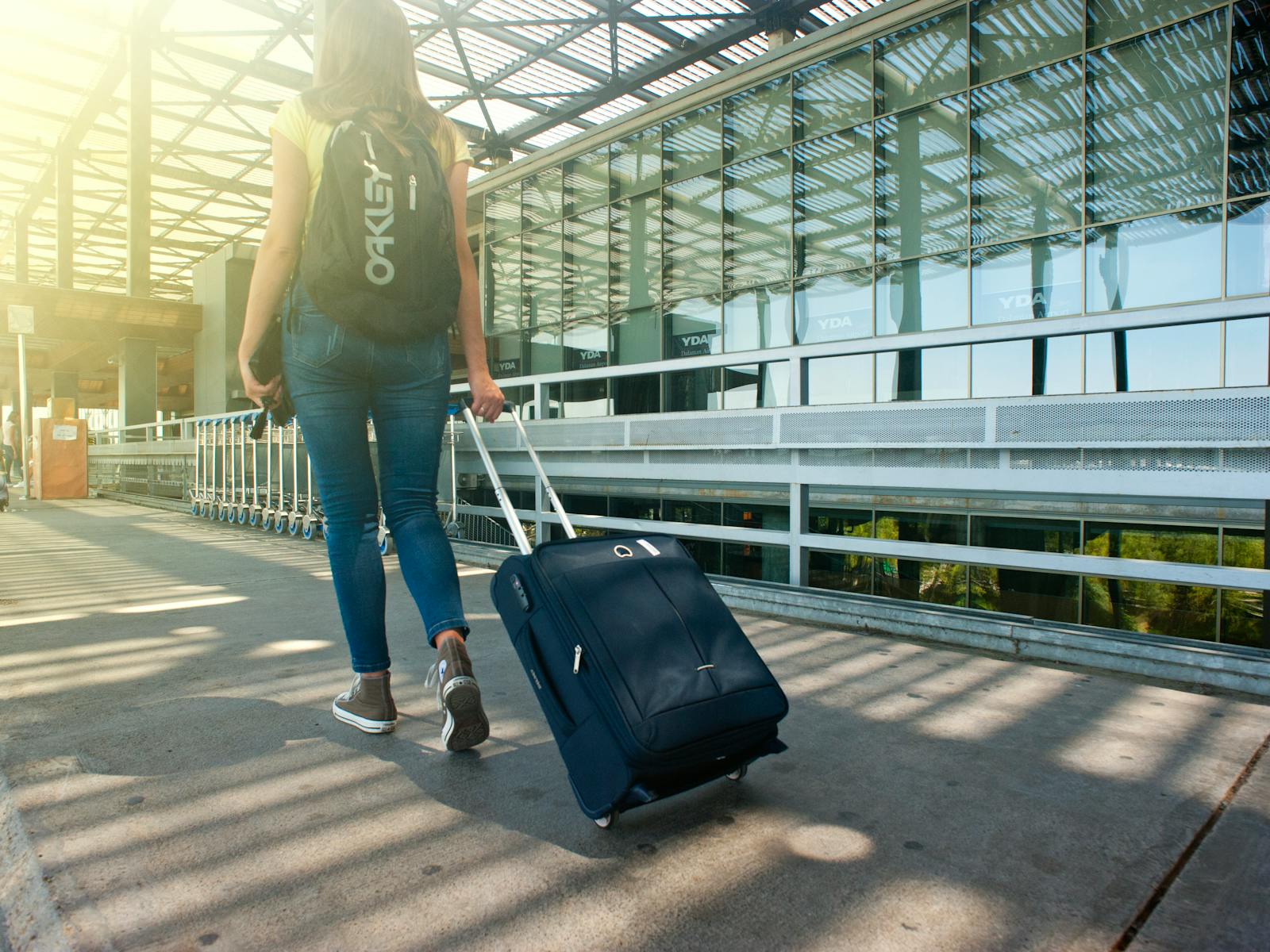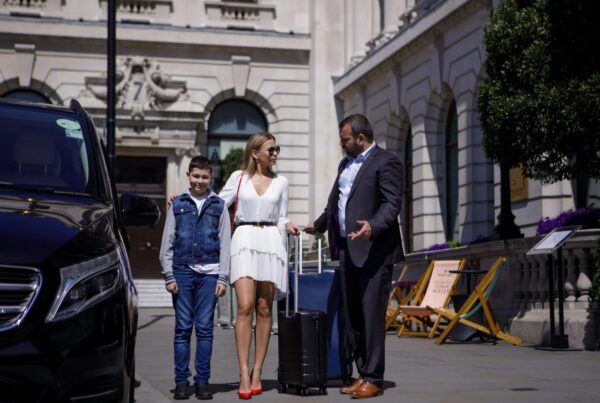Bank holiday travel can be a nightmare. Crowds, delays, and high prices often spoil what should be a relaxing break. But with some smart planning, you can dodge the chaos and enjoy your trip.
Table of Contents

Booking early is key to avoiding bank holiday travel stress. Airlines and hotels often raise prices as the holiday nears. By planning ahead, you can snag better deals and have more options. It’s also wise to travel on less busy days, like the day before the bank holiday starts.
Packing light can make your journey smoother. Stick to carry-on luggage if possible. This saves time at check-in and reduces the risk of lost bags. It’s also helpful to pack snacks and entertainment for potential delays. Being prepared can turn a frustrating wait into a more bearable experience.
Key Takeaways
- Book travel and accommodation well in advance to secure better prices and options
- Pack light and smart to ease your journey through busy transport hubs
- Stay flexible and prepared for potential delays or changes to your travel plans
Understanding Bank Holiday Travel Dynamics

Bank holiday travel brings unique challenges. Many people take advantage of the extra day off to plan trips, leading to crowded transport hubs and roads.
Popular destinations see a surge in visitors during these times. Coastal areas, national parks, and major cities often become hotspots for travellers.
Transport networks face increased pressure. Trains, buses, and planes may run at full capacity, while motorways can experience heavy traffic and delays.
Accommodation prices tend to rise during bank holidays. Hotels, holiday rentals, and campsites often charge premium rates due to high demand.
Weather plays a crucial role in travel patterns. Sunny forecasts can prompt last-minute trips, while poor weather might cause cancellations or changes in plans.
Local events and festivals frequently coincide with bank holidays. These attractions can draw large crowds, further impacting travel and accommodation availability.
Travel times typically increase during these periods. Journeys that normally take a few hours might require additional time due to congestion and delays.
Strategic Booking for Bank Holidays
Booking wisely for bank holidays can save you money and stress. Smart timing and using loyalty programmes are key to getting the best deals.
Choosing the Right Dates
Book your travel as early as possible. Prices tend to rise closer to bank holidays. Try to fly on the actual bank holiday, as it’s often cheaper. If you can, travel a few days before or after the holiday rush.
Avoid peak times like Friday evenings or Monday mornings. Mid-week flights are usually less crowded and cheaper. Use price comparison sites to find the best deals across different dates.
Consider nearby airports for better prices and fewer crowds. Be flexible with your travel dates to find the best deals.
Leveraging Reward Schemes and Discounts
Sign up for airline and hotel loyalty programmes. You can earn points for free flights, upgrades, or hotel stays. Look out for special bank holiday offers from these programmes.
Use credit cards that earn travel points. Pay for your holiday with these cards to build up rewards faster.
Check for package deals that bundle flights and hotels. These can often be cheaper than booking separately. Look for early booking discounts or last-minute deals.
Sign up for airlines’ newsletters to get notified of sales. Some offer exclusive discounts to email subscribers. Don’t forget to check social media for flash sales and promo codes.
Preparing for Your Journey

Getting ready for bank holiday travel requires smart packing and organised paperwork. These tips will help you prepare efficiently and avoid common pitfalls.
Bank Holiday Packing Hacks
Pack light to save time and hassle. Use packing cubes to organise clothes and maximise space. Roll clothes instead of folding to prevent wrinkles and fit more in your bag.
Make a list of essentials to avoid forgetting important items. Include versatile clothing pieces that can be mixed and matched. Pack a small toiletry bag with travel-sized items to comply with airline regulations.
Bring a portable charger and adapter for your electronics. Pack snacks and a refillable water bottle to save money and stay hydrated during delays.
Travel Documents Checklist
Keep all important documents in one easy-to-access place. Use a travel wallet or folder to store passports, boarding passes, and hotel bookings.
Make copies of important documents and store them separately. Take photos of your passport and other ID on your phone as a backup.
Check visa requirements well in advance. Ensure your passport is valid for at least six months beyond your return date. Print out or save digital copies of your travel insurance policy and emergency contact numbers.
Navigating Transport Options

Bank holidays often bring increased traffic and crowded public transport. Choosing the right travel method can make or break your trip. Planning ahead and considering alternatives helps avoid frustration.
Road Travel Advice
Driving offers flexibility but requires careful planning. Check traffic reports before setting off. Leave early to beat rush hour, or travel at night when roads are quieter. Pack snacks and water in case of delays.
Keep your car in good shape with a pre-trip check. Top up fluids, check tyre pressure, and ensure you have enough fuel. Consider alternate routes in case of jams.
Use sat-nav apps with live traffic updates. They can suggest faster routes if problems arise. Take regular breaks on long journeys to stay alert.
Public Transport Insights
Trains and buses can be less stressful than driving, but they get busy on bank holidays. Book tickets well in advance for better prices and seat choices. Off-peak travel is often cheaper and less crowded.
Check for planned engineering works or strikes that might disrupt services. Have a backup plan ready just in case.
Pack light to make moving through stations easier. Bring entertainment for long waits or delays. Consider breaking up long journeys with stops at interesting places along the way.
Minimising Travel Stress
Bank holiday travel can be taxing. These tips will help you stay calm and healthy during your journey.
Coping with Delays and Cancellations
Pack extra snacks and entertainment in case of holdups. Download your airline’s app for real-time updates. Keep important documents and a change of clothes in your hand luggage.
If your flight is cancelled, know your rights. EU regulations may entitle you to compensation. Ask staff about rebooking options or hotel stays.
Stay flexible and patient. Delays are often beyond anyone’s control. Take deep breaths and try to stay positive.
Maintaining Wellness During Transit
Stay hydrated by drinking plenty of water. Avoid too much caffeine or alcohol, as they can dehydrate you. Pack a reusable water bottle to fill up after security.
Move around regularly to boost circulation. Do simple stretches in your seat or walk up and down the aisle when it’s safe.
Get enough rest before and during your journey. Use earplugs and an eye mask to block out noise and light. A travel pillow can make sleeping more comfortable.
Eat light, healthy meals to keep your energy up. Fresh fruits and nuts are great snack options. Avoid heavy, greasy foods that might upset your stomach.
Safety and Security Measures

Bank holiday travel often means crowded spaces and increased risks. Travellers should take extra precautions to stay safe and secure during these busy periods.
Keep valuables close and use anti-theft bags or wallets. Be aware of pickpockets in crowded areas like train stations and airports. Don’t leave luggage unattended.
Make copies of important documents like passports and tickets. Store digital versions securely online as backups.
Use trusted taxi services or ride-hailing apps rather than unlicensed cabs. Be cautious when accepting help from strangers with luggage or directions.
Stay alert in busy areas. Avoid distractions like headphones or mobile phones that make you an easy target. Trust your instincts if a situation feels unsafe.
Travel insurance is crucial. It can cover lost belongings, trip cancellations, and medical emergencies. Read policies carefully to understand what’s included.
Check travel advisories before your trip. Be aware of any safety concerns at your destination. Follow local laws and customs to avoid trouble.
Pack a small first aid kit with essentials like plasters, pain relievers, and any personal medications.
Family Travel Considerations
Travelling with children requires extra planning and preparation. Choosing suitable accommodations and keeping kids entertained are key to a smooth family holiday.
Entertaining Children on the Go
Pack a variety of travel-friendly activities to keep little ones busy. Bring colouring books, crayons, sticker books, and small toys. Load tablets with educational games and shows for screen time.
Audiobooks and music playlists can be lifesavers during long journeys. Play classic road trip games like I Spy or 20 Questions. Encourage kids to keep travel journals or take photos.
Plan regular stops for stretching and running around. Pack healthy snacks and drinks to avoid hungry meltdowns. Bring comfort items like blankets or favourite stuffed animals for naps.
Family-Friendly Accommodations
Book lodgings with amenities that cater to families. Look for hotels with pools, play areas, or kids’ clubs. Self-catering apartments or holiday homes offer more space and kitchen facilities.
Check if rooms have fridges for storing milk and snacks. Request cots, high chairs, or rollaway beds when booking.
Research nearby parks, playgrounds, and family-friendly attractions. Choose accommodations within walking distance of kid-friendly restaurants and activities.
Consider all-inclusive resorts for hassle-free meals and entertainment. Look for places that offer babysitting services if parents want a night out.
Technological Aids for Efficient Travel
Modern technology offers valuable tools to streamline your bank holiday travels. From planning to arrival, apps and devices can make your journey smoother and less stressful.
Essential Travel Apps
Mobile apps have become indispensable for savvy travellers. Download these before your trip:
• Google Maps: Navigate unfamiliar places and find petrol stations, restaurants, and attractions.
• Citymapper: Get public transport directions in major cities worldwide.
• Skyscanner: Compare flight prices and set price alerts.
• TripIt: Organise all your bookings in one place.
• Google Translate: Overcome language barriers with instant translations.
Remember to update your apps before travelling and check if they work offline. This can save mobile data and help in areas with poor signal.
Staying Connected
Reliable internet access is crucial for modern travel. Here are some options:
• Portable Wi-Fi hotspot: Rent or buy a device that provides internet access for multiple devices.
• Local SIM card: Purchase a local card for cheaper data rates.
• International roaming: Check with your provider for affordable plans.
• Free Wi-Fi finder apps: Locate free hotspots in your destination.
To protect your data on public networks, use a Virtual Private Network (VPN). This encrypts your internet connection and keeps your information safe.
Post-Trip Reflection and Feedback
After returning from a bank holiday trip, it’s wise to take time to reflect. Think about what went well and what could have been better. This helps improve future travel plans.
Make notes on accommodation, transport, and activities. Were they good value for money? Did they meet expectations?
Jot down any surprises or challenges faced.
Consider leaving reviews for hotels, restaurants, and attractions. These help other travellers make informed choices. Be honest and fair in your feedback.
Check bank statements to track spending. This gives a clear picture of holiday costs and helps with budgeting for future trips.
Organise photos and souvenirs. They’re great reminders of the journey and can inspire future travel ideas.
Share experiences with friends and family. This can be a fun way to relive the trip and get tips for their future travels.
Lastly, start a travel wishlist for the next bank holiday. Fresh ideas can make planning the next getaway easier and more exciting.
Frequently Asked Questions
Bank holiday travel can be tricky. These questions cover key topics to help you plan a smooth trip.
What are the best strategies for securing affordable transport and accommodation during peak bank holiday times?
Book early to get the best deals. Compare prices across different websites and apps.
Be flexible with your dates if possible. Look for package deals that include both transport and lodging. Sign up for loyalty programmes to earn points and get discounts.
How can I pack efficiently to minimise stress and ensure I have everything I need for a bank holiday getaway?
Make a packing list a few days before your trip. Roll clothes instead of folding to save space. Use packing cubes to organise items.
Pack versatile clothing that can be mixed and matched. Don’t forget essentials like chargers and toiletries.
In the event of travel delays or cancellations, what are my rights and how should I proceed to resolve the situation?
Check your passenger rights with the airline or train company. You may be entitled to compensation or rebooking.
Keep all travel documents and receipts. Contact the company’s customer service right away. Stay calm and polite when speaking with staff.
What are the key things to consider when planning a bank holiday travel itinerary to avoid common pitfalls?
Allow extra time for travel and queues. Check for planned engineering works or strikes.
Have a backup plan for activities in case of bad weather. Book popular attractions in advance. Keep your itinerary flexible to avoid stress.
Can you provide insight into the most effective ways to navigate through crowded transport hubs during bank holiday rushes?
Arrive early to avoid last-minute rushes. Use online check-in where possible.
Follow signs and staff instructions. Keep important documents easily accessible. Stay alert and watch for updates on departure boards.
What advice do you have for families travelling with children during busy bank holiday periods to ensure a smooth journey?
Pack snacks and entertainment for kids. Choose family-friendly accommodation.
Plan regular breaks during long journeys. Bring a small first aid kit. Consider travelling during off-peak hours if possible.





